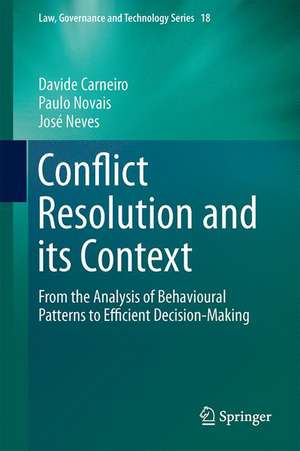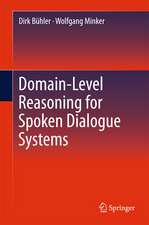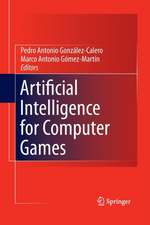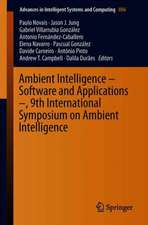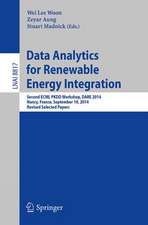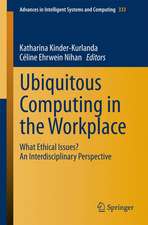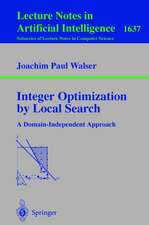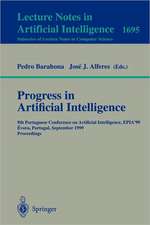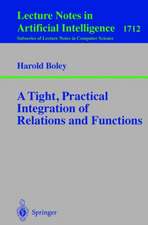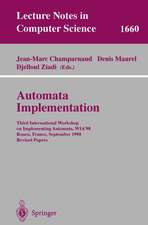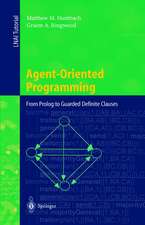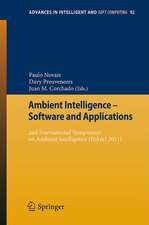Conflict Resolution and its Context: From the Analysis of Behavioural Patterns to Efficient Decision-Making: Law, Governance and Technology Series, cartea 18
Autor Davide Carneiro, Paulo Novais, José Nevesen Limba Engleză Hardback – 25 iun 2014
| Toate formatele și edițiile | Preț | Express |
|---|---|---|
| Paperback (1) | 646.12 lei 6-8 săpt. | |
| Springer International Publishing – 17 sep 2016 | 646.12 lei 6-8 săpt. | |
| Hardback (1) | 652.41 lei 6-8 săpt. | |
| Springer International Publishing – 25 iun 2014 | 652.41 lei 6-8 săpt. |
Din seria Law, Governance and Technology Series
- 18%
 Preț: 950.33 lei
Preț: 950.33 lei - 24%
 Preț: 645.10 lei
Preț: 645.10 lei - 20%
 Preț: 691.09 lei
Preț: 691.09 lei - 20%
 Preț: 574.07 lei
Preț: 574.07 lei - 20%
 Preț: 879.80 lei
Preț: 879.80 lei - 20%
 Preț: 878.75 lei
Preț: 878.75 lei - 15%
 Preț: 720.23 lei
Preț: 720.23 lei - 18%
 Preț: 1122.56 lei
Preț: 1122.56 lei - 18%
 Preț: 1130.27 lei
Preț: 1130.27 lei - 15%
 Preț: 642.83 lei
Preț: 642.83 lei - 18%
 Preț: 950.52 lei
Preț: 950.52 lei - 18%
 Preț: 1009.85 lei
Preț: 1009.85 lei - 18%
 Preț: 1115.14 lei
Preț: 1115.14 lei - 15%
 Preț: 653.14 lei
Preț: 653.14 lei - 18%
 Preț: 949.23 lei
Preț: 949.23 lei - 18%
 Preț: 1014.76 lei
Preț: 1014.76 lei - 15%
 Preț: 638.43 lei
Preț: 638.43 lei - 18%
 Preț: 1124.30 lei
Preț: 1124.30 lei - 18%
 Preț: 1124.60 lei
Preț: 1124.60 lei - 18%
 Preț: 999.45 lei
Preț: 999.45 lei - 18%
 Preț: 892.42 lei
Preț: 892.42 lei - 15%
 Preț: 640.37 lei
Preț: 640.37 lei - 18%
 Preț: 947.35 lei
Preț: 947.35 lei - 20%
 Preț: 340.32 lei
Preț: 340.32 lei - 18%
 Preț: 1692.20 lei
Preț: 1692.20 lei - 18%
 Preț: 954.93 lei
Preț: 954.93 lei - 24%
 Preț: 789.36 lei
Preț: 789.36 lei -
 Preț: 397.59 lei
Preț: 397.59 lei - 20%
 Preț: 876.57 lei
Preț: 876.57 lei - 18%
 Preț: 900.49 lei
Preț: 900.49 lei - 18%
 Preț: 941.50 lei
Preț: 941.50 lei -
 Preț: 392.97 lei
Preț: 392.97 lei
Preț: 652.41 lei
Preț vechi: 815.50 lei
-20% Nou
Puncte Express: 979
Preț estimativ în valută:
124.84€ • 130.34$ • 103.32£
124.84€ • 130.34$ • 103.32£
Carte tipărită la comandă
Livrare economică 05-19 aprilie
Preluare comenzi: 021 569.72.76
Specificații
ISBN-13: 9783319062389
ISBN-10: 3319062387
Pagini: 245
Ilustrații: XXVIII, 279 p. 71 illus., 46 illus. in color.
Dimensiuni: 155 x 235 x 22 mm
Greutate: 0.61 kg
Ediția:2014
Editura: Springer International Publishing
Colecția Springer
Seria Law, Governance and Technology Series
Locul publicării:Cham, Switzerland
ISBN-10: 3319062387
Pagini: 245
Ilustrații: XXVIII, 279 p. 71 illus., 46 illus. in color.
Dimensiuni: 155 x 235 x 22 mm
Greutate: 0.61 kg
Ediția:2014
Editura: Springer International Publishing
Colecția Springer
Seria Law, Governance and Technology Series
Locul publicării:Cham, Switzerland
Public țintă
ResearchCuprins
Dedication.- Foreword.- Preface.- Part I.- 1 Introduction.- 2 Traditional and Alternative ways to Solve Conflicts.- 3 Advantages and Disadvantages of Avoiding the Courtroom.- 4 Artificial Intelligence in Online Dispute Resolution.- 5 Context and its Importance.- Part II.- 6 An Agent-based Architecture for a Second Generation ODR Tool.- 7 Information Retrieval.- 8 The Conflict Resolution Process.- Part III.- 9 A Framework for Developing Sensible Environments.- 10 Inferring Conflict Resolution Styles.- 11 Stress in Conflict Resolution.- Part IV.- 12 Analysis of Practical Results.- 13 Concluding Remarks and Future Thoughts.
Textul de pe ultima copertă
This book studies how technological solutions can be used to alleviate the current state of legal systems, with their clogged up courtrooms and inefficient conflict resolution methods. It reviews the shortcomings and disadvantages of traditional and alternative conflict resolution methods and turns to Artificial Intelligence for problem-solving techniques and solutions.The book is divided into four parts. The first part presents a general and systematic analysis of the current state of the legal systems, identifying the main problems and their causes. It then moves on to present UMCourt: a framework for testing and prototyping conflict resolution services. This framework was developed with the objective of using Artificial Intelligence techniques to build a service environment for conflict resolution. The third part of the book takes a step into the future by analyzing the use of Intelligent Environments in the support of conflict management and resolution. It describes the approach taken and the experiments performed in the Intelligent Systems Lab of the University of Minho. The final part of the book contains the conclusions and shows the potential advantages of the use of Intelligent Environments as a way to implement better conflict resolution procedures (virtual or real), in which all the participants have access to more and better information, and are able to take better informed decisions.
Caracteristici
Highlights the opportunities Artificial Intelligence presents for improving conflict resolution Covers a cutting-edge topic and describes innovative solutions to conflict resolution Provides a systematic and updated overview of the current state of legal systems as well as the main drawbacks of the current alternative approaches Introduces the implementation of an environment that "reads" the users in order to improve conflict resolution processes Includes supplementary material: sn.pub/extras
